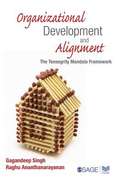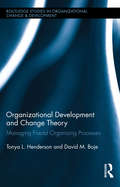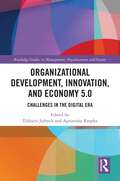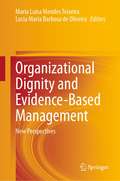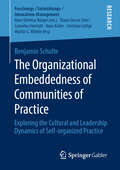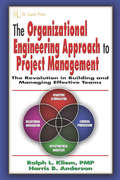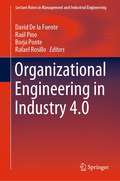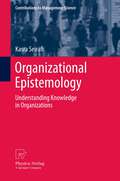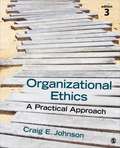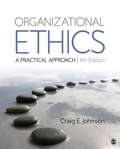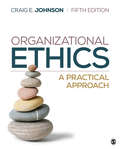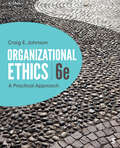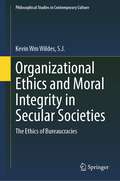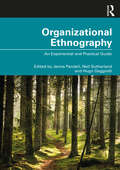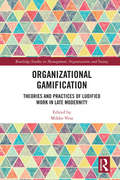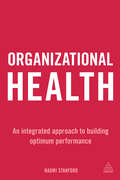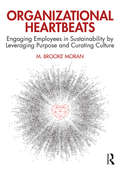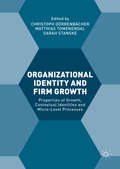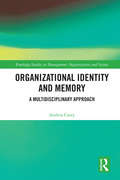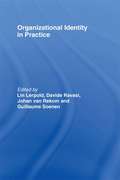- Table View
- List View
Organizational Development and Alignment
by Gagandeep Singh Raghu AnanthanarayananOrganizational Development and Alignment: The Tensegrity Mandala Framework takes a close look at the underlying axioms of Organization Design and Alignment that have not only proliferated rigid structures and oppressive hierarchies, but also have rendered employees worldwide as mere instruments and dehumanized the organizational context. By looking at an organizational system as inherently a Tensegrity structure, an architectural paradigm vitalized by Buckminster Fuller, the book offers the reader insights into the dynamic tensions, role-holding, and dialog possibilities that pervade the modern organization across stakeholders such as investors, customers, employees and the ecology. By containing the organization as a 'Mandala', a dynamic force field with arrays of polarities and counter-pulls that burden the leadership, it explicates the various dilemmas that are contained within, and offers insights into design, policies, culture and role-effectiveness. The Tensegrity Mandala empowers the organization of today towards reflexivity and transformation. It serves as a blueprint for growth, organization development, dialog, and institutionalizing leadership.
Organizational Development and Change Theory: Managing Fractal Organizing Processes (Routledge Studies in Organizational Change & Development)
by David M. Boje Tonya HendersonThis book offers a fresh perspective on organizational development and change theory and practice. Building on their recent work in quantum storytelling theory and complexity theory, Henderson and Boje consider the implications of fractal patterns in human behavior with a view toward ethics in organization development for the modern world. Building on Gilles Deleuze and Felix Guattari’s (1987) ontology of multiple moving and intersecting fractal processes, the authors offer readers an understanding of how managing and organizing can be adapted to cope with the turbulence and complexity of different organizational situations and environments. They advocate a sustainable, co-creative brand of agency and introduce appropriate, simple tools to support organizational development practitioners. This book offers theory and research methods to management and organization scholars, along with praxis advice to practicing managers.
Organizational Development, Innovation, and Economy 5.0: Challenges in the Digital Era (Routledge Studies in Management, Organizations and Society)
by Agnieszka Rzepka Elżbieta JędrychThis edited collection comprehensively explores Economy 5.0, focusing on critical aspects such as organizational development, intellectual capital, soft agent dynamics, and agility. Through in-depth analysis, real-world case studies, and forward-looking perspectives, the book provides readers with practical insights into the challenges and opportunities that define contemporary organizations and skills that can be applied in different cultural and organizational contexts. The overarching goal is to empower individuals to thrive in the dynamic economic landscape of Economy 5.0 by promoting sustainable practices, fostering future-proof skill sets, encouraging ethical leadership, and inspiring innovative solutions. It addresses issues and trends that are universally relevant in today's globalized world, offering a multidisciplinary perspective that will make it valuable to researchers, academics, practitioners, and students in the fields of organizational development, management, innovation, sustainability, and ethical leadership.
Organizational Dignity and Evidence-Based Management: New Perspectives
by Maria Luisa Mendes Teixeira Lucia Maria Barbosa de OliveiraThis book discusses dignity in the organizational context. Combining diverse theoretical and methodological approaches, as well as empirical studies, this book examines the concept of dignity between organizations and a variety of stakeholders. Going beyond the traditional approach of the relationship between company and employees, and beyond the traditional perspective of human dignity in a Kantian or post-Kantian approach, this volume innovates by discussing dignity from different epistemic perspectives, bringing to the fore dignity, inserted in different organizational and cultural contexts. The volume is divided into five parts. The first part is dedicated to the concept of dignity in the organizational sphere (dignity inside organizations, dignity between organizations and their stakeholders, and dignity in business-to-business relationships) discussed under different epistemic approaches. The second part deals with dignity in the relationships between companies and employees. The third part deals with the relationship between companies and clients. The fourth part of the book studies business-to-business relationships, addressing the educational sector, restaurants, and microcredit. Finally, the fifth part focuses on the relationships between the organizational dignity construct and other constructs, such as stress, spirituality and trust. Opening new theoretical and methodological perspectives for the study of dignity, this book will be of use to researchers and students studying management, leadership, and business strategy, as well as management and HR professionals.
The Organizational Embeddedness of Communities of Practice: Exploring the Cultural and Leadership Dynamics of Self-organized Practice (Forschungs-/Entwicklungs-/Innovations-Management)
by Benjamin SchulteThis dissertation uncovers how informal and self-organized communities of practice as a source of learning and adaptability are embedded in their formal organizational surroundings. Based on an interpretative case study of three communities of practice within the German Federal Armed Forces, the author theorizes this embeddedness as shaped through cultural dynamics and leadership processes. In particular, the author draws on a practice lens and complexity leadership theory in explaining how communities of practice generate new resources (i.e., adaptability), produce and reproduce broader socio-cultural structures, and are enabled as well as influenced by formal leadership.
The Organizational Engineering Approach to Project Management: The Revolution in Building and Managing Effective Teams
by Ralph L. Kliem PMP Harris B. AndersonDespite the advent of new methodologies and powerful tools, many projects continue to fail even when applying the well-accepted criteria of successful projects. These dismal results beg the question: If new methodologies and tools don't really impact project results, what does? Studies from major think tanks agree: people problems are the number-on
Organizational Engineering in Industry 4.0 (Lecture Notes in Management and Industrial Engineering)
by David De la Fuente Raúl Pino Borja Ponte Rafael RosilloThe book includes the latest research advances and cutting-edge analyses of real case studies in the disciplines of Industrial Engineering and Operations Management from diverse international contexts.This work presents a revised version of the best papers presented at the XXIII International Conference on Industrial Engineering and Industrial Management promoted by ADINGOR (Asociación para el Desarrollo de la Ingeniería de Organización), which took place at the Polytechnic School of Engineering of Gijón (University of Oviedo), Asturias, Spain, from July 11th to 12th, 2019.
Organizational Epistemology
by Kasra SeirafiThis book presents an in-depth perspective of knowledge as a fundamental process of any organization rather than just another resource to be managed. The author presents a process-oriented theory of creating and applying knowledge directed towards both researchers and practitioners. In this book the author develops normative knowledge management guidelines which draw from a unique view on knowledge, discussed in the field of philosophy since Plato but neglected by most knowledge management authors - by applying a philosophically grounded 'social epistemology' to organizations. The guidelines in this book call for an open and reflective space of knowledge creation, aligned with goals and structures of the organization. Numerous examples, field studies, and an application to the main case study on Seven-Eleven Japan complement both the descriptive view on knowledge as well as the normative guidelines presented in this book.
Organizational Ethics: A Practical Approach
by Craig E. JohnsonWe are constantly faced with ethical decisions, no matter what organizations we join. The ethical choices we make determine the health of our businesses, schools, government agencies, religious congregations, charities, and other institutions. Our ethical decisions also determine our career success or failure. Bestselling author, Craig E. Johnson, shows how we can develop our ethical competence, just as we develop our abilities to manage or oversee operations. Every chapter of Organizational Ethics: A Practical Approach, Third Edition provides readers with opportunities to apply ethical principles and practices in a variety of settings through self-reflection, analyses, projects, and discussion. Written in a reader-friendly style, each part of the book is layered around organizational behavior. The parts introduce moral theories used in ethical problem-solving; examines individual motivations; looks at the ethical dilemmas of groups, teams, and leaders as well as offers strategies for creating ethical cultures and promoting social responsibility. This book shows how readers can develop their ethical expertise and provides opportunities to practice problem-solving to defend their decisions.
Organizational Ethics: A Practical Approach
by Craig E. JohnsonWe are constantly faced with ethical decisions, no matter what organizations we join. The ethical choices we make determine the health of our businesses, schools, government agencies, religious congregations, charities, and other institutions. Our ethical decisions also determine our career success or failure. Bestselling author, Craig E. Johnson, shows how we can develop our ethical competence, just as we develop our abilities to manage or oversee operations. Every chapter of Organizational Ethics: A Practical Approach, Third Edition provides readers with opportunities to apply ethical principles and practices in a variety of settings through self-reflection, analyses, projects, and discussion. Written in a reader-friendly style, each part of the book is layered around organizational behavior. The parts introduce moral theories used in ethical problem-solving; examines individual motivations; looks at the ethical dilemmas of groups, teams, and leaders as well as offers strategies for creating ethical cultures and promoting social responsibility. This book shows how readers can develop their ethical expertise and provides opportunities to practice problem-solving to defend their decisions.
Organizational Ethics: A Practical Approach
by Craig E. JohnsonEvery industry must confront unethical behavior in the workplace. Whether your students want to pursue careers in business, education, public service, or the military, they will need a solid foundational understanding of ethics and the impact their decisions will have on their organizations and their own lives. Bestselling author, Craig E. Johnson, illustrates the best approaches for developing our ethical competence. Organizational Ethics: A Practical Approach equips students with the knowledge and skills they need to make a positive difference in their workplace. Self-assessments, reflection opportunities, and application projects allow students to practice their ethical reasoning abilities. Each part of the book focuses on a different aspect of ethical organizational behavior, examining ethics at the individual, group, and organizational levels. The revised Fourth Edition includes a new feature titled Contemporary Issues in Organizational Ethics and new case studies on current topics such as fake news, sexual harassment, and cultural appropriation. This book shows how readers can develop their ethical expertise and provides opportunities to practice problem-solving to defend their decisions.
Organizational Ethics: A Practical Approach
by Craig E. JohnsonEvery industry must confront unethical behavior in the workplace. Whether your students want to pursue careers in business, education, public service, or the military, they will need a solid foundational understanding of ethics and the impact their decisions will have on their organizations and their own lives. Bestselling author, Craig E. Johnson, illustrates the best approaches for developing our ethical competence. Organizational Ethics: A Practical Approach equips students with the knowledge and skills they need to make a positive difference in their workplace. Self-assessments, reflection opportunities, and application projects allow students to practice their ethical reasoning abilities. Each part of the book focuses on a different aspect of ethical organizational behavior, examining ethics at the individual, group, and organizational levels. The revised Fourth Edition includes a new feature titled Contemporary Issues in Organizational Ethics and new case studies on current topics such as fake news, sexual harassment, and cultural appropriation. This book shows how readers can develop their ethical expertise and provides opportunities to practice problem-solving to defend their decisions.
Organizational Ethics: A Practical Approach
by Craig E. JohnsonWith an interdisciplinary focus, Organizational Ethics equips students with the knowledge and skills they need to make a positive impact in a variety of workplaces. Author Craig E. Johnson builds the text around interdependent levels of organizational behavior, examining ethics at the individual, group, and organizational levels. Self-assessments, reflection features, and application projects give students ample opportunity to practice their ethical reasoning abilities. The Fifth Edition includes over 25 new case studies on current events and prominent figures, 24 new self-assessments, and new discussions on topics such as cross-cultural ethical conflict and organizational virtue.
Organizational Ethics: A Practical Approach
by Craig E. JohnsonWith an interdisciplinary focus, Organizational Ethics equips students with the knowledge and skills they need to make a positive impact in a variety of workplaces. Author Craig E. Johnson builds the text around interdependent levels of organizational behavior, examining ethics at the individual, group, and organizational levels. Self-assessments, reflection features, and application projects give students ample opportunity to practice their ethical reasoning abilities. The Fifth Edition includes over 25 new case studies on current events and prominent figures, 24 new self-assessments, and new discussions on topics such as cross-cultural ethical conflict and organizational virtue.
Organizational Ethics: A Practical Approach
by Craig E. JohnsonOrganizational Ethics: A Practical Approach, Sixth Edition provides readers with opportunities to apply ethical principles and practices in a variety of settings through self-assessments, analyses, projects, and discussion. Bestselling author, Craig E. Johnson, shows how we can develop our ethical competence, just as we develop our abilities to manage or oversee operations.
Organizational Ethics: A Practical Approach
by Craig E. JohnsonOrganizational Ethics: A Practical Approach, Sixth Edition provides readers with opportunities to apply ethical principles and practices in a variety of settings through self-assessments, analyses, projects, and discussion. Bestselling author, Craig E. Johnson, shows how we can develop our ethical competence, just as we develop our abilities to manage or oversee operations.
Organizational Ethics and Moral Integrity in Secular Societies: The Ethics of Bureaucracies (Philosophical Studies in Contemporary Culture #29)
by Kevin Wm Wildes, S.J.This book explores an undeveloped area in postmodern thought: organizational ethics. Ethical debates and analyses usually focus on a particular act or action, an actor, and/or how a secular society should address any of those particular persons or events. In the Post Modern age, ethical decisions and policies are characterized by moral and cultural pluralism. However, there is a second factor that complicates ethical and policy decisions even further. This book argues that in the postmodern age ethical decisions often need to be understood as part of the decision making of organizations and bureaucracies. Organizational decisions often have direct bearing on the choices made by individuals. Two areas that exemplify postmodern issue are the areas of health care and education. For example the decision making of Admissions Officers in American higher education, are influenced by decisions that have been made by the university about the size of the class and the diversity of the class. Health Care organizations make policy decisions that affect every aspect of a patient’s care from admission to treatment and the types of care that are or are not offered. Both education and health care are the object of the significant investment of resources, both areas are value laden in postmodern, pluralistic societies, and yet we do not have a comprehensive method to understand them or evaluate them. This book is of interest to bioethicists, physicians, nurses, health care policy students, educational policy experts, students and government regulators.
Organizational Ethnography: An Experiential and Practical Guide
by Jenna PandeliThis textbook explores practices, first-hand experiences and emerging ideas within organizational ethnography, providing a toolkit that prepares ethnographers for the uncertainties and realities of fieldworking. Students faced with the complexities of qualitative observational techniques and considerations, such as the scope of the research, the personal and professional intertwined life of the qualitative research or the decision of when to leave the field, will find the book an extremely useful, practical guide. A range of experiences from a variety of academics at different stages of their career, to highlight the differences in practices, approaches and encounters, are presented. The themes of the individual chapters cover three main areas: aspects to consider and reflect on before undertaking an ethnography, the process and experiences of conducting ethnographic work and considerations for after the fieldwork. Particular attention is given to appreciating the complexity and practicalities of ethnographic work, providing a more experience-driven text, and understanding perspectives from a range of different approaches to organizational ethnography. This book should be a recommended text for advanced undergraduate and postgraduate students studying research methods within Business and Management. It is particularly important for all students and academics undertaking qualitative research, especially ethnography.
Organizational Gamification: Theories and Practices of Ludified Work in Late Modernity (Routledge Studies in Management, Organizations and Society)
by Mikko VesaThis edited volume presents an interdisciplinary collection of texts that examine the practice of gamification, the use of game design elements in non-game contexts, specifically as an organization and management research problem. As we travel deeper into the twenty-first century, it is becoming increasingly clear the late modernity is re defining its take on games and play. Following what has been termed a general ludification or playification of society, corporations are beginning to see games and play as resources rather than as a wasteful practice. We are witnessing the emergence of the practice of gamificiation with the intention of mobilizing play’s motivational power for capitalist production. This book outlines both the essential "how tos" and also critically explores their links to diverse strands of organization theory such as institutionalism, business ethics, critical theory and organizational behavior. Gamification research has been mostly conducted within disciplines such as information studies, game studies and information systems science. This is a paradoxical state of affairs; whilst gamification aims at being a transformative intervention in work processes and practices and is being deployed as such by practitioners. This book will be of value to researchers, academics and students interested in management and organization studies.
Organizational Grit: Turning passion and perseverance into performance: the view from the health care industry
by Thomas H. Lee Angela L. DuckworthFeature
Organizational Health
by Naomi StanfordOrganizational Health is an organization's ability to function effectively, to cope adequately, to change appropriately, and to grow from within. A healthy organization is just that in all its aspects: people, process, structures, systems, behaviours and governance. It is one where appropriate adaptive, maintenance and development activities are integral to maintaining performance and alignment in the operating environment. Organizational Health takes an informed look at the critical and interdependent elements of an organization that must be maintained in a healthy state for managers to meet their business goals. Using a practical, structured approach it l covers: understanding and assessing organizational health; the impact of structures on organizational health such as hierarchies, alliances and joint ventures; control methods such as corporate governance, ethics and compliance; maintenance and development including OD, change management, learning and workplace environment; sustainability including carbon footprint and business ecosystems; indicators of health and dysfunction.
Organizational Heartbeats: Engaging Employees in Sustainability by Leveraging Purpose and Curating Culture
by M. Brooke MoranThis employee engagement book focuses on the HOW of engaging employees in sustainability through four diverse case studies, thought-prompting questions and tips, as well as a unique model of employee engagement to guide strategy. The book includes both the mechanics of engagement and also the art of engagement through practices of authenticity, collective leadership, curating culture, and leveraging purpose. The power of purpose-driven employee engagement efforts featured in this book will inspire readers to help employees thrive, as a by-product of doing so is retaining employees, who effectively drive strategy, which lifts the organization and bolsters the economic bottom line. Numerous examples of successful engagement initiatives at Dubai Chamber of Commerce and Industry, Arizona State University, Seventh Generation, and Danone North America will catalyze readers’ imaginations regarding what is possible at their organizations. Moran’s purpose-driven employee engagement model will guide readers and their teams to hone initiatives into ones that will align with the heart and the systems of the organization. Prompting tips and questions throughout the text invite readers to engage with the material, so it is advised to have a notebook to record ideas while reading. Whether sustainability directors, human resource or talent management professionals seeking guidance on how to engage employees, middle managers striving to drive organizational change, or business school students wanting to learn about purpose-driven organizations, this book provides myriad tangible resources, as well as inspiring cases, to support the human capital that serves as the heart of organizations.
Organizational Identity and Firm Growth
by Christoph Dörrenbächer Sarah Stanske Matthias TomenendalThis edited volume focuses on the interplay between organizational identities and firm growth, an area which remains largely unexplored. Firm growth in its various forms is omnipresent in the contemporary business environment, but does not always lead to positive results. At the same time, some organizations are growing faster than their peers, leading to questions of organizational growth antecedents. In addition to the dominant economic reasons in strategic literature, the volume seeks to integrate psychological aspects to the discourse, thereby considering the micro, meso and macro level. By providing both insights into international academic thinking and into practical examples of small and medium-sized companies in Berlin, the authors identify new findings concerning successful growth strategies.
Organizational Identity and Memory: A Multidisciplinary Approach (Routledge Studies in Management, Organizations and Society)
by Andrea CaseyOrganizational Identity and Memory analyzes the relationship between organizational identity and organizational memory, in particular history and commemoration. The goal is to further our understanding of the role of this relationship in processes critical to today’s organizations: the evolution of organizational identity, the creation and use of organizational memory, organizational learning and change, and employee identification with organizations. The literature on organizational memory and organizational identity has developed independently and at times in separate disciplines. Scholars have debated whether organizational identity is mutable or enduring. In this debate, organizational history, a form of organizational memory, has been a key factor, but neither side of the debate has pursued indepth the well-developed literature on collective memory to understand this relationship and its impact on organizational identity. Organizational memory defined as commemoration and history has been connected to different forms of identity, both national and organizational, but this relationship and its impact on organizational memory processes has not been explored. Organizational Identity and Memory takes a multidisciplinary approach to explore and articulate the dynamic relationship between organizational identity and memory, drawing on work from anthropology, history, organizational studies, and sociology. A multidisciplinary theoretical framework for future research on organizational identity and memory is presented. Implications for managers are discussed with engaging insights from organizational research and practices in creating corporate museums, galleries, visitor centers, and other displays of this relationship.
Organizational Identity in Practice
by Guillaume Soenen Lin Lerpold Davide Ravasi Johan Van RekomOrganizational Identity in Practice provides much-needed, in-depth studies on what happens when aspirations, claims and beliefs interact. Given the practical needs of managers and students, this exciting new text provides readers with more insight into what differences in these identity aspirations, claims and beliefs really mean and what we may expect to occur when these differences become visible and what the outcomes of these processes are likely to be. The diverse case studies illustrate how well-known firms have dealt with the broad issues of "who we are as an organization" and "what makes us similar or distinct from others" and cover a broad range of industries, firms, and organizational forms. The cases from companies such as Air France, AT&T, Bang & Olufsen, BP, Statoil, Starbucks, Scania and Alfa Romeo are focused on the broad topics of organizational identity, strategy and the environment, multiple and conflicting identities, the construction of identities, and how organizations express and project their identities. The authors give scholars, students and managers valuable ideas on how to deal with organizational identity challenges within firms.
